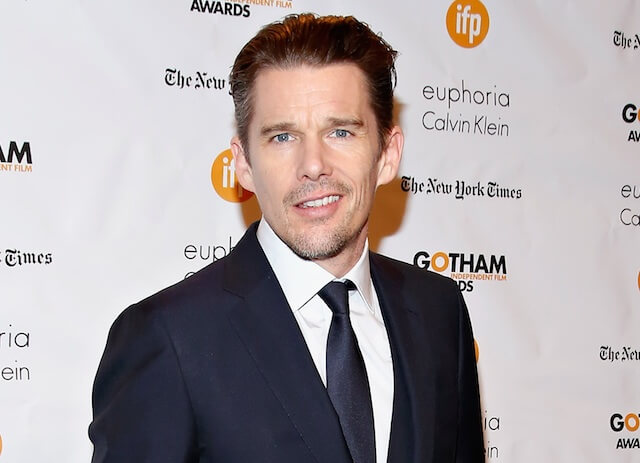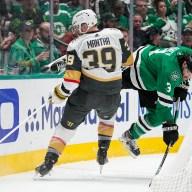The movie version of Ethan Hawke has many faces: the blank slate youngster (“Dead Poets Society”), the Gen-X snark machine (“Reality Bites”) and the out-of-control rogue (“Brooklyn’s Finest”), to name a few. The one you meet in person is closest to the one in Richard Linklater movies: friendly, laughing and most of all talkative. He’s doing press for “Predestination,” an Australian sci-fi thriller — adapted from a Robert Heinlein short story — in which he plays a time traveling agent. Conversation predictably roams. It veers from watching movies on planes (“It’s one of the best places to watch a movie, because your focus is so clear. You have nowhere else to be.”) to another idea-driven sci-fi picture, “Snowpiercer,” to another film about time, this one featuring him, “Boyhood.” It was almost like being in a Linklater chat-a-thons, only instead of strolling through a picturesque city we’re trapped in an anonymous, fluorescent-lit office, sitting next to an empty desk. We dropped a fair amount of “Predestination” spoilers in our discussion, so we’ll put that talk at the bottom. Just don’t say we didn’t warn you.
This is a thriller, but one with a lot of heady ideas sifting through it.
I think about “Predestination” the way I think about “The Sirens of Titan” or Philip K. Dick or Ray Bradbury. When someone can use science-fiction to make you think, it’s a neat trick. If you embark on a philosophical discussion, people start to yawn and get uncomfortable. They feel like they’re in college in a way they don’t like, because it can be pretentious. But when you do it with science-fiction, you can provoke thought in a really fun way. That’s what I like about this movie. I knew when I read the script that if we do this without screwing it up, it would be like a good Zen koan: it sends you thinking. Without revealing too much, one thing it plays with is the fluidity of gender.
It’s a meditation on how there is no masculine or feminine. It’s a war. There have been great Sam Shepard plays written on the same theme, that there’s this war between the masculine and feminine inside the self. You’ve tended to do a lot more genre films recently than you once did, like “The Purge.” But they tend to actually be about something.
I keep trying to make art films and also make thought-provoking genre films. It turns me on about acting to work inside different genres. There’s certain kinds of challenges that actors love. “I’ll play a person who has a lisp from Ireland in 1911!” Or there’s shape-shifting personalities that a lot of great actors — Forest Whitaker, Vincent D’Onofrio, Philip Seymour Hoffman, Daniel Day-Lewis — do. But I’ve never excelled at that. One of the things I like doing is being inside different kinds of cinema. That’s helped me be different. One could make the case that some of the ideas here are ones touched on “Boyhood.”
It’s really funny to me: “Boyhood” premiered at Sundance and a couple weeks later, “Predestination” and “Boyhood” both showed up at South by Southwest. I really did feel I had two time travel movies at the same time. You really could make a case that the whole “Before” trilogy and “Boyhood” are time travel movies too. You’re visiting yourself at different times, which is what all of these movies are about, one in a very uber-sci-fi way. It’s something we all long to do. The future scares us so much and we romanticize the past so much that it creates a cool energy. In that sense, we kind of live in an age where we can time travel. We have photos and video and, in your case, movies that show us exactly what we looked like or acted like when we were younger. So we can kind of visit ourselves — and, you know, feel good or terrible about how we wound up. They did a thing that BAFTA does for me called “A Life in Pictures.” They showed a lot of clips from a lot of different movies I’ve done over the last 30 years. It was a little like attending your own funeral. We’re all in the moment we’re in. One of the weird things about watching “Boyhood” is we all kind of think of ourselves as the same. I’ll meet a 22-year-old and I’ll think, “Oh, we’re the same age.” I see some college kid and think, “Oh, I’m just a little bit older than you.” And they think, “I’m a LOT older than him.” When you watch “Boyhood” it forces you to look at yourself and realize, “I’m not the same person I was when the movie started.” But I’m looking through the same keyhole, so it seems the same to me. I have a friend who’s white and gray. I didn’t know him when he was young, but apparently he was a flaming redhead. He says when he looks in the mirror he almost always sees the same red hair. He has to make himself focus and then he sees that it’s white. His kneejerk thing in passing the mirror is he just sees the red hair. I totally get that. 2002, when you guys started shooting “Boyhood,” really doesn’t seem that long ago until you see pictures of yourself then versus now.
There’s another interesting Rick and I talked about a lot while making it: When we first started it, I thought the world was going to change a lot more. If you had done a movie from ’58 to ’70, the look of the world was a lot different. The way people dressed, the way cars looked, the energy of the environment was a lot different. But “Boyhood” looks basically the same. I think that’s because the biggest movement for us has been technology. The way you dress and the way I look, we wouldn’t look out of place 12 years ago. But the way people dress in 1970 would have looked out of place in 1958. I think it’s the phones. It’s the phones, the computer, the Internet. So much of our energy has been diving towards the Internet. We haven’t had the need for culture to change in other ways. We’ve internalized progress rather than externalized it.
For the moment.
“Boyhood” itself doesn’t change aesthetically. It has the same shooting style throughout, even though it’s been shot over a dozen years. It has this deceptively plain look.
A lot of [Linklater’s] movies do. He’s allergic to salesmanship. A lot of directors like to hyperbolize life. He’s allergic to that. If a scene looks too lit, even if it looks beautiful, he doesn’t like that. If a girl looks beautiful but it doesn’t look real, he’s like, “Ugh.” Girls are beautiful the way they are. BELOW BE SPOILERS. If you haven’t yet seen the film — or don’t mind having a twisty film ruined utterly —turn back now. For the rest, proceed after this picture:
One idea that stands out is this notion of the mutability of the self. That the characters played by you and Sarah Snook wind up being the same person — and that she’s someone who went from female to male — speaks to this idea that we change so dramatically from when we were younger to middle age to near-death. That for me is the essential idea of the film. My favorite scene in the movie is at the Laundromat at the end, when my older character says, “If you kill me the cycle keeps going. If you forgive me and love me we can move on.” And he can’t do it. He’s so unlovable. We all have that hideous, crippled old man that we’re scared we’re going to become. It’s reminiscent of people who radically change political affiliations as they get older, like people who were staunch liberals in youth and then become Fox News addicts.
You see that with Jon Voight. He makes “Coming Home” and now he’s all of a sudden a radical rightie.
Sci-fi cinema has largely been taken over by special effects, but this is more on the hard sci-fi side.
Robert Thurman, the head of Buddhism at Columbia University — Uma’s dad and my kids’ grandfather — he could do a beautiful talk about meditation, on the interconnectedness of man, all of it inspired by “Predestination.” It’s about the infinity cycle, the idea that we’re all going and coming back again like the seasons. Where do we come from? Sarah and I talked about how it works as a two-act structure. It’s almost like a play, in that way. We each get a scene where we act with ourselves. Hers is a love scene. And mine is a murder scene. What I think is so beautiful is the first act ends with the self falling in love with the self, and the second act ends with the self saying, “I hate you.” That’s life! A part of us nurtures ourselves and another part sabotages ourselves at every turn. We all go through that.
Interview: Ethan Hawke compares ‘Predestination’ to ‘Boyhood’

Getty Images
Follow Matt Prigge on Twitter @mattprigge


















